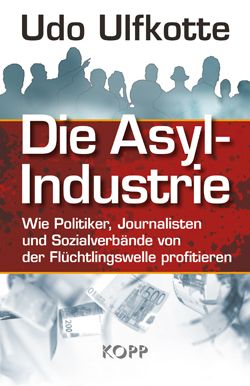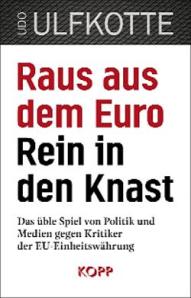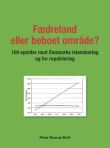Meltdown of the monetary system is not new
From the laws of nature versus laws of humanity
– no insurmountably terminological shallow-like clichés included
Real capital is the quintessence of those goods that produces the means of our consumption, and that maintains itself while the production is going on. Capital as a function. The permanent real capital are bind for a longer period in land, buildings and equipment, eventually in inventory. The floating capital is bound in the input of factors in the process of production while this process is running, and eventually in the inventory. The process of production will typically be repeated.
Private capital is characterized by the sum of rights that permits unearned income (often in form of interest and profit due to appreciation), where it is not possible to show any connection to productive activity.
The capital formation should be concentrated in production to satisfy the all kind of needs including the needs of meaningful activity of the labour. The natural order will always turn capital formation in this most profitable real direction among human beings in the long run. But there has never been and never will be a natural order thanks to the politicians acting within an ineffective constitutional protection of the citizens.
Only with this interference the capital formation is directed the stream into private capitalization instead or abroad. As it gets worser the politicians have to incur debt by the international bankers, because all the money issuing at home gets the prices of our goods to rise further than the competition allows. The papers (shares and bonds) in the private limited company and the state-debt-bonds make it even worser. The purchasing power has been pulled out of real production by to high wages, made too high by the too high taxes, both of them simply drains the real capital to private interest earning capital outside the production.
You cannot claim that all political leaders got insane precisely at the same time.
I don’t buy it.
An example:If you get a public subsidy covering a part of the cost in order to prompt you to renew your apartment houses but without collecting the necessary amount of money by taxation, perhaps I would ask why you did not renew the houses without the public subsidy, and while you are being very fond of the public subsidy, perhaps I will also try to get a public subsidy to renew those houses of mine. The raison to the public inter-ference is the political problems in this case following the increasing unemployment also caused by political interference and the monopoly (read close to dictatorship) of the trade unions. They are talking about renewing the towns. That is a lie. There are several other cases collected from the ideology on the life of the so-called good people that every modern politician literally has to live on. With the public subsidy the rents of the apartments increases perhaps 15-20 p.c., and the so-called value of the apartment houses increases with the capitalization of this increase (the present value of the yearly of monthly increases). When the total rent of the apartments of Copenhagen from 1914 to 1926 increased with more than 40 mill. ddk. a year the fine originators have without the society had become richer created about 500 mill.ddk more private capital, realized, when the apartment houses were sold. That is the capitalization of 40 mill. kr. a year anno 1925. A big part of this amount ran into consumption. In WW a surplus capitalization was made by the share and bond markets and by loans used to pay dividends accounted on a false basis of the values of inventory and equipment.
Read Professor Lauritz V. Birck and the Danish History Of Ship Companies 1912-1920 (and about The Crash Of Landmandsbanken, in Danish http://www. lilliput-information.com/economics/truth/app3.html .)
Denmark was very close to the limit of bankruptcy 1923 thanks to our fine President of the centralbank Rubin and Brandes in the Department of Finances, who prefered to finance the unsatisfied needs and the unpleasantness of the war by loans, and then planned to let the small-holders’ values collapse after the war.
While they were dancing and at last were dying in paper money issued by fraud in USA the prices double more times in Denmark in the beginning of 1920s. Enormous fortunes were collected on private hands, while the state just through bonds into the market. If the state had collected a taxation on fortunes once and for all in 1919 instead of telling the people that you can finance a war with nothing, Denmark would not have had any very serious problems later on. Instead they let the inflation run directly into deflation, where all values (real capital) began to be destroyed.
You have capitalized the possibilities of the future yield and trained the propertied classes to believe that war is a good business, the best investment at all. But you forgot to give them a lecture on the uncertainty of exchange rates, of the rate of interest and of the purchasing power to unspecialized (uneducated) individuals.
The real problem is not that people do not live twice here on the Earth. Their experience is just imperfect when it comes to reality, to real life, and this fact has been used time after time.
Some will try to learn from books and studies. But is not easy even if you are pretty clever. In four years 1935-1939 the concept state debt totally lost its meaning. In 1935 it meant everything, in 1939 it meant nothing. If you asked the logical question following this nonsense in the 1969 you got an answer from the professor saying between the lines that you had not understood anything at all. You certainly have to be strong as a 19 years old country boy.
A little from accurated financial history
A few quotations: Under “Must national debt be paid back”?
“…it is not a natural law that national debt ever should be paid back. The state must naturally pay back a loan, when the payments have to be paid, but if it is not convinient to decrease the debt, the payback can always be done by taking another loan… It is true by both raising a loan and by paying back that the only thing that matters is in what way it effects the economic life or the welfare of the society. There can not be given grounds for paying back national debt, if the effects that the paying back has is not wanted. If there is strong demand for labour under full employment at a moment in the society, the result can only be higher wage that necessary will lead to a rise in the prices, then it is perhaps convinient to collect more tax than necessary to cover the running expenditures, that means pay back the debt, because in that way the demand for resources will decrease. Before such condition has occured or better, before you wish to reduce the demand and the income of the society or a least stop its increasing, there obviously can not be given grounds for reducing the national debt…”
“When the state (on the other hand) is paying out money, it always receives the most of the amount from one or more citizens, and directly it creates an income in this way that correspond to the expenditure reduced by the part that goes abroad. If we for a moment assume that there is balance of the payments understood, as to every increase in import there is an export increase of the same amount, there is created with every expenditure an income of the magnitude in the society”.
“If the state in the same tempo, as it gives money away, collects taxes that are paid of means that the taxpayers otherwise would have given out for demand, or raises a loan that is yielded from money, that on the other hand would have been given out for labor and materials, there will obvious not neither be a smaller nor a larger total income in society, the only thing that happens is that the state now confiscates some resources that on the other hand would have been confiscated to private purposes, or would have benefited other persons than those who have the money now”.
“If the state on the other hand get the concerned money by taking it from its account in the national bank and the national bank does not tightening the credit elsewhere, or the state borrow on the market of bonds and the national bank by convinient buying of bonds prevents a fall in the courses, the expenditure of the state means (not alone) that there is created directly a whole new income of the same amount, but that those, who receive the money, again give some of it to people, who once again increases the expenditures. In this way an expenditure of the state creates for example within a year an increase in the income of the society in the same year, an income that perhaps is 23 times bigger than the paid out amount of money, and because the taxes in this country with the existing laws of taxation are about 25 p.c. of the income, will such an expenditure in the concerned or the next year perhaps give the state and municipalities an increasing tax income to an amount the half or three forth of the amount that can be the basic of the new expenditures or it can be used for lowering the taxes”.
Under “The balance sheet of the state”:
“If you actually want to operate with an idea of balanced sheet of the state as an expression of its economic situation, it must be the ability of the citizens to pay taxes compared with the expenditures that state is planning..” (unquote of the later Professor and Rockefeller Fellow Joergen Pedersen in: ‘Topical Economies Problems’, 1939)
Keynesianism, that Joergen Pedersen here is making marketing for, deals with problems of the society in a very unrealistic way. They are made to formulations of problems in a mathematical language of symbols or something just as limited, there has to be cleared up (as here) a logical, coherent chain of thoughts that neither fit the problem, as it really is, nor include all those things that practically effects the solution of the problem.
For example the influence on the economy of the funds, and the inflation have an inferior place in the works of Keynes and in the works of his epigones.
The same can be said about the national debt, as it appears. The new system (at that time) that should be built up in the after war period, should give exactly free admission to incur national debt. And it certainly did.
The targets for the society are always something like employment, activity and similar. The effect of the public sector on the economy is not interesting to a Keynesian, and you will at once be in doubt if the declared targets for the economy are anything but to ‘the exterior’ opinion, as Keynes himself called it, before he won the Nobel Prize (se below).
The whole entrance to the Keynesian way of thinking gives evidence of a fatal need of interest of reality, for example if the assumption all together and each of them draw a true picture of the reality at all, and then this cyberspace reality that they seek to give predictions to. It will be a special problem to the Keynesian to try to cover himself up behind assumptions all the time, so what he has said, is logic, when all assumptions have been remembered. If these logical relations, scholastic rides tell anything about the effects of different political economic actions from the authorities towards some correctly described phenomena in the society do not in principle interest the Keynesian. Here he has secured his retreat. It is a very central part of the Keynesian learning to train this. I have trained myself until I could not take more lies. My upbringing simply forbad me to continue the lies.
Therefore I must say: Do not listen to the Keynesian, he will coax you to do, what he believe in, and if you do not understand, what he is telling you, he will explain to you at last by referring to your lack of education (scholastic).
Precicely the same method that what used about 100 years before when you was explain why the gold standard what mattered
I have to inform you that the Danish Joergen Pedersen, who became a Rockefeller Fellow, perhaps could have won the Nobel Prize instead of John M. Keynes. Pedersen was not very known in the Swedish Academy, and many of his earlier writings were not written in English.
The practical rediscovery:
From 1994 they are talking about paying back the national debt in Denmark. But nothing of the kind happens, the debt still rises every year until recently (2006). From 31. March we were expected to forget it ever excisted according the rather twisted information in Jyllands-Posten. If the national debt was beginning to be paid back the unemployment would increase, the keynesians would tell you. The unemployment in Denmark is between 500,000 and 700,000 or 17-24 p.c. of the laborforce in 1999. I have tried to give an total presentation of the unemployment-accounts-problems on: http://www.lilliput-information.com/economics/led/index.html (in Danish).
Pupils who always work and always talk, tell you that the unemployment in Denmark is less than 150,000. That is the figure when you when you concentrate on the unemployed members of unemployment security system. The expelled ones do not exist. They did not in the Soviet Union and DDR either.
In 1933 the unemployment was 33 p.c. (the highest ever in Denmark) of the labor force (accounted in 1933). In September 1939 (when the World War II broke out) the unemployment increased 16,000, even if 20,000-30,000 were called to the military forces. In the years before unemployment had been reduced by public occupational work (‘New economics’, ‘Recovery’ or ‘New Deal’ made in USA), by exporting more to Germany, which were preparing for war, and by national debt, that means transforming more and more real capital to private capital.
At this time the unemployment were especially reduced by the Keynesian so-called ‘kickstarting’ operations. That the money was destroyed in this way did nearly nobody discover, because the war also made a new international monetary system that was based entirely on credit economy alone and and paper that is the same.
That the effect of this blind using of the theories of Keynes led to a public sector ruled by bureaucratic principles, a public sector that was a good deal larger than the things ruled by private, individual dispositions, and a colossal national debt ought to have been foreseen, but the theories did very convenient not tell this, the theories that were followed blind for 70 years. The dictatorship based on the nonsense writings by Karl Marx also lasted for 70 years. Nothing has been left to uncertainty if you look in right direction.
How should an unskilled individual know what to do? That is the reason why I got the right to vote.
A little accuracy about the between war period:
John Galbraight still maintains the German economy recovered from 1933 by civil production, and he intend to let us believe that the German method was a kind of the so-called new economics. He seems to want us to forget a lot. In 1932 4.1 mill. Germans were unemployed. Two years later the number had been reduced to 2,4 mill. In 1998 (the election year) the unemployment in Germany with nearly the same population as in 1933 was officially 4,3 mill. The SPD-politicians just before the election to the Bundestag maintained that this number was not correct. The real or the true number was about 10 mill. (the same four years later at the next election 2002). In the late 1920s and the beginning of the 1930s the motorization came as a gift from the technical knowledge, the arming had been started, and productions and development of arms had long been going on in cooperation with the Soviet Union (unofficially). A restrictive control of the currency, tax discount tickets, and especially the suspension of the trade union wage rates was the axis of the German recovery policy from 1933.
From 1924 Hjalmar Horace Greeley Schacht was commissioner of the the Reichcurrency i Germany, later on President of Reichbank. April 7th 1924 his attack on inflation began with the decision to stop credit. This led to the Dawes Plan og August 16th 1924. The interest rate rose to the sky and the share prices were reduced to the half. With a short pause from spring 1930 to spring 1933 Schacht continued as the highest in charge in Reichbank under the Hitler regime until November 26th 1938. Schacht actually fought the deflation in Germany.
Some do still think that the way Hitler (or Schacht) went to get rid of the unemployment was to print notes. On the contrary as just mentioned. Schacht was not a Nazist, and he was highly respected in every central bank of the Western world. He opposed to Hitlers plans of war and chasing. Schacht ruled the emission of money issuing, decided the economic and monetary policy and controlled the effect. In 1938 Hitler accepted a proposal by Hermann Göring to introduce 4 years plans like the 5 years plans in the Soviet Union. At the same time Hitler intensified the chasing of judes. Then Schacht decided to go (January 1939). He was called back twice but left to join the forces fighting against Hitler.
Hjalmar Schacht got the claims of reparation, first decided in with the Dawes Plan of 1924 (after Worldwar I) reduced with the Owen D. Young Plan (1929). The original claims on Germany of the Versailles Treaty in Paris of 1919 would have brought Germany in famine with thousands of deads. All the industrial network found its way through the international lines but the ordinary germans without the knowledge of what was happening and possibility to use this knowledge went either bankructcy, lost their savings and got hungry. J. M. Keynes documentated this very properly in his excellent book The Economic Consequences Of the Peace (of December 12th1919) in which he took the Versailles Treaty apart. All qualified economists of the time agreeded with Keynes, e.g. Gustav Cassel and Bertil Ohlin and a lot of other. The year before (1918) Hjalmar Schacht wrote in his diary:
“Violence not even Money/Is shaping the World/Intellectual Power and Traditional Trade and Living/Prevail upon Worlds to Alter”
(translated from German).
Back to capitalization
– without real bases no reality :
This process of capital formation towards private capital or out of the country is speeded up in a society where capital is a stronger and stronger condition to live in freedom and security.
“History do not repeat. Oh I see, people are becoming better and better all the time”. It is tempting to take dismantling for development, I must say. To the first sentence of the last paragraph, try : http://www.lilliput-information.com/economics/gol1/gol1.htm
But no sound production has been carried out caused by the Danish (1993-2000) public subsidy either. The money has been circulated, and the citizens still believe it was sound. But the prices are beginning generally to rise. At the same time the politicians have artificially lowered the interest rate in order to get activity to increase, and by this they stupidly hope to reduce unemployment. Instead they tempt the capital to leave the country. Let us take the subsidy (there are hundreds of issues as well):
Public subsidies draw the initiatives and the money to those areas that the politicians especially are concentrating the subsidies on. The activity then increases for some time, and the suppliers notice sales are indeed growing too. If the subsidies are increased all the time the Economy Of Command and the State Of Civil Servants grow, so does the distortion of the economic natural order. When subsidies stops or they are just not increased further all the time, the depression slowly becomes deeper and deeper, and the end result is even worser than before the subsidy. The reason for this is that politicians deal with problems that do not excist without the politicians almost all the time.
The thirties were also dominated by this subsidy-economy. New Deal it was called, in reality mostly inspired by J. M. Keynes from England. The economist who designed the Bretton Woods Aggreement. Jacques Delors, a French Socialist and the former President of the European Commission, said in 1995 that he was very fond of subsidies like those used in Denmark. Now he is a member of the Bilderberg Group.
Today company emptying is going on (much more explanation to this on: http://www.lilliput-information.com/economics/gol2/gol2.html#pri), it continues while some of the authorities participate themselves in double parts. Just one tiny example more of what is going on, also in Denmark. The state issues bonds at a discount with a constant interest rate on to call in purchasing power that should have benefited the society as real capital, but that is not enough. On this route of death the fine leaders have also tried for a period of ten years now to collect foreign currency abroad in competition with all the other European debt and deficit countries by selling the bonds for foreign currency. They are tempted by the constant rate of interest and secured from collapse of exchange rates in countries they use to buy from. Loan debt in fairness is the most pressing burden.
They built on a lie, they continue on lies until they are dead. Then their fry of the devil takes over the visible power based on more fraud. “In the long run we are all dead”, wrote Keynes.
It is the same all over Europe – except for Switzerland, Ireland and Norway. The real capital has not yet been totally destroyed by war, mostly by secret abundance public consumption in the public and union foundations, much more than the highest taxation of the world managed to finance. Wage confiscation must be the right word, when the rate of taxation exceeds 50 p.c. of income – today all in all about 65 p.c. In Europe an abnormal amount of paper, and even under favourable possibilities of production it would have been a scandal to talk truthfully of prosperity at an acceptable rate employment. But Europe is even lacking of innovation, low technical level and false education at the same time they are constructing a new compulsory and political ruled currency of unit. As a result the direction of the capital formation is e.g. USA and unearned private capital. They try to protect themselves from the truth an responsibility, not as they use to say the Europeans from Globalization, in reality they believe in, what their friends the multi trillionaires abroad told them: “You shall become the real power brokers in a centralized and politically correct European Empire”
I would correct it to: Take your position in the line of Cesar, Filip II, Louis XIV, Napoleon, Stalin, Kaiser Wilhelm and Adolph Hitler.
To secure that we will not return to real life again they even transformed our children to animals. Steady and persistent for a period of 150 years: http://www.lilliput-information.com/economics/wu.html.
And that is also the reason why I look forward to (economic) Globalization without ideology, and the reason why I made some outlines of a new stable international monetary system:
https://danmark.wordpress.com/2006/05/19/new-monetary-system/
It is better for the all peoples to die a natural death than to be executed by the devil’s servants here on Earth. The natural death what so ever makes the few survivers stronger than before. The devil’s servants in contrast to this always execute the strongest.
To go further I would propose:
http://www.lilliput-information.com/economics/gol1/gol1.htm
and
http://www.lilliput-information.com/economics/tida.html
M. Sc. (Economics) Joern E. Vig, Denmark


























 Indvandrings-
hastigheden voksede
endnu mere i 2013
Indvandrings-
hastigheden voksede
endnu mere i 2013



[…] https://danmark.wordpress.com/2006/06/14/when-capital-leave-real-production/ […]
Pingback af Danmark » Top and Bottom — 14. juni 2006 @ 22:35
[…] https://danmark.wordpress.com/2006/06/14/when-capital-leave-real-production/ […]
Pingback af Danmark » Didacting EU–Commissioner — 15. juni 2006 @ 10:40
[…] https://danmark.wordpress.com/2006/06/14/when-capital-leave-real-production/ […]
Pingback af Top and Bottom « Dissidentpress — 28. oktober 2006 @ 09:49
I thank you for your comment.
Kommentar af Rosie — 16. februar 2007 @ 22:49
[…] https://danmark.wordpress.com/2006/06/14/when-capital-leave-real-production/ […]
Pingback af Will the Welfare be Re-arranged « Dissidentpress — 10. marts 2007 @ 23:18
[…] https://danmark.wordpress.com/2006/06/14/when-capital-leave-real-production/ […]
Pingback af Advarsler mod lav ledighed (?) « Danmark — 3. januar 2008 @ 10:44
[…] Når al kapital bindes i privatkapital med en afkastgivende rettighed, f.eks. statsgæld eller i offentlige aktiviteter, så bliver der for lidt til realproduktionen. Derfor søger den væk eller udskifter indlandet arbejdere med udlandets arbejdere, hvis det muligt. Det er ikke overraskende, vi beskrev forholdene, som de med sikkerhed ville blive allerede for fem år siden her på bloggen: https://danmark.wordpress.com/2006/06/14/when-capital-leave-real-production/ […]
Pingback af 1 maj: Der er gang i den – og det gaar afgjort derudad mod enden som detalje-planlagt « Danmark — 1. maj 2011 @ 18:48